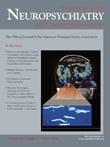To the Editor: We have read, with enthusiasm, several case reports discussing the use of acetylcholinesterase inhibitors in the treatment of persons who sustained traumatic brain injury.
1,
2 We submit the following case report to further support the usage of donepezil in treating the cognitive dysfunction and memory deficits observed in traumatic brain injury.
Case Report
Our patient was a 58-year-old male who was hospitalized after a witnessed syncopal episode. He had a computed tomography (CT) scan that showed bilateral subarachnoid hemorrhages and presented with a Glasgow coma scale of 12. According to the patient’s wife, prior to admission the patient had become more irritable, complaining of headache and nausea. There was no reported history of alcohol or drug use.
On the second hospital day, a repeat CT of the head visualized “small hemorrhagic contusions most prevalent in the supraorbital right frontal lobe and right lateral temporal lobe” with a preserved midline. At this point the patient was oriented times one, unable to follow simple commands, and scored a +3 on the Richard Agitation Sedation Scale (RASS).
An EEG indicated intermittent generalized slowing which was maximal over the left frontal head region. The focal slowing over the left frontal region suggested an underlying structural injury.
After 2 weeks of treatement with quetiapine, the patient’s RASS was 0, and he was able to complete an initial Mini-Mental State Examination (MMSE) scoring 13, indicating moderate cognitive impairment. His short term memory and working memory were impaired and he demonstrated constructional apraxia and fluent aphasia. It was then the patient was begun on donepezil, 5 mg/day p.o.
Twelve days after beginning donepezil treatment, the patient demonstrated less paraphasic errors and perseveration. Cognitively, he was oriented times two. His short term memory improved; however, his working memory continued to be poor. In the ensuing 2-week period, he was no longer aphasic. He was oriented times three and his short term and working memory improved, as he could repeat four digits forward and backward. A clock drawing test was without evidence of constructional apraxia. His final MMSE score was 29/30. The patient’s discharge psychotropics were donepezil, 5 mg/day, and quetiapine, 200 mg t.i.d.
Discussion
Cholinesterase inhibitors have been used to treat disturbances of attention, arousal, memory, and executive functions in both dementia and head trauma;
3 both conditions can affect the neurotransmission of acetylcholine.
4 Case reports have highlighted using donepezil, a central acting selective acetylcholinesterase inhibitor, improving cognitive deficits in as little as 3 weeks.
1In approximately 3 weeks, our patient’s wide domain of traumatic brain injury-induced cognitive impairments improved with donepezil, as indicated by a 16 point elevation on his MMSE score—significantly shorter than an “untreated” course of three to 12 months.
5 Our patient did show improvement in executive functions, especially working memory, perseveration, and organization.
Our results, taken in combination with other case reports, suggest the need for double blind, placebo controlled studies utilizing acetylcholinesterase inhibitors in the treatment for the cognitive deficits of mild to moderate traumatic brain injury.

